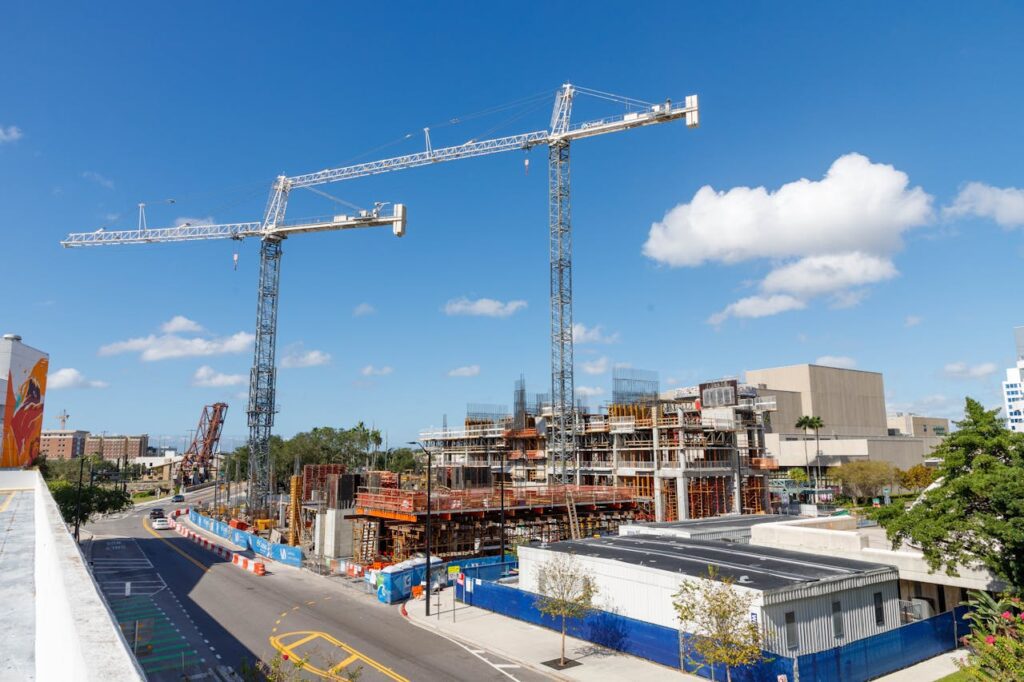Unveiling the hidden advantages of pre-construction planning for commercial developments brings a stark contrast to projects without this crucial step. While some may view it as an unnecessary delay, the meticulous planning during the preconstruction phase actually sets the stage for smoother operations and cost savings in the future. By carefully strategizing with an experienced design before breaking ground, developers can avoid costly mistakes, streamline timelines, and enhance overall project efficiency. This proactive approach not only minimizes risks but also maximizes returns on investment in both the short and long term.
Understanding The Importance Of Pre-Construction Planning
Minimizing Risks
Pre-construction planning plays a crucial role in commercial developments by identifying potential risks early on, offering an opportunity for investment and enabling effective communication among many developers. By conducting a thorough analysis of the project site, materials, timeline, and risk assessment, developers can anticipate challenges before they escalate. For instance, a detailed assessment might reveal unstable soil conditions that could impact the structural integrity of the building. Addressing these issues during the planning phase helps prevent costly delays and modifications later.
Proper pre-construction planning also allows for effective risk mitigation strategies to be put in place. Through clear communication among all stakeholders involved – from architects and engineers to contractors and investors – potential risks can be openly discussed and solutions collaboratively developed. This proactive approach fosters a more cohesive team environment where everyone is aligned on addressing challenges together.
- Identifying risks early on
- Proactive risk mitigation strategies through communication
Maximizing Efficiency
Efficiency is another hidden advantage of pre-construction planning for commercial developments. When every detail is meticulously planned out ahead of time, it streamlines the entire construction process. For example, by having a well-defined construction schedule that outlines tasks, deadlines, and dependencies, teams can work cohesively towards project milestones without unnecessary delays or confusion. Moreover, proper pre-construction planning ensures that resources are allocated efficiently throughout the project lifecycle. From labor to materials procurement to equipment rentals, having a comprehensive plan in place helps optimize resource utilization while minimizing wastage.
Key Elements Of Preconstruction Services
Site Evaluation And Feasibility Studies
During the pre-construction phase, one of the key elements is conducting thorough site evaluations and feasibility studies. This involves assessing the land where the commercial development will take place to ensure it meets all necessary requirements for construction. For example, analyzing soil conditions, drainage systems, and environmental impact are crucial steps in this process.
Another aspect is performing feasibility studies to determine if the proposed project aligns with local zoning regulations and building codes. These studies help identify any potential challenges or obstacles that may arise during construction due to site-specific factors. By addressing these issues early on, developers can avoid costly delays or modifications later in the project timeline.
- Ensuring land suitability
- Analyzing environmental impact
- Complying with zoning regulations
Budget Estimation And Permit Acquisition
Preconstruction planning also entails creating accurate budget estimations for the entire project scope. This includes calculating costs for materials, labor, equipment, permits, and other expenses associated with construction. By developing a detailed budget upfront, developers can better manage their finances throughout the project lifecycle.
Moreover, obtaining necessary permits and approvals is a critical component of preconstruction services. This involves working closely with local authorities and buyers to secure permits for various aspects of the development such as building construction, electrical work, plumbing installations, etc. Failing to obtain required permits can lead to legal issues and halt progress on the construction site.
- Detailed budget planning
- Securing permits efficiently
- Avoiding legal complications
Collaboration With Stakeholders
Collaboration plays a vital role in successful pre-construction planning as it requires close coordination between architects, engineers, contractors, developers, and other stakeholders involved in the project. Effective communication among team members ensures that everyone is aligned with project goals from inception through completion.
For instance:
- Architects provide design expertise.
- Engineers offer technical guidance.
- Contractors contribute practical insights into constructability.
- Developers oversee overall project management responsibilities.
By fostering collaboration among these key players during preconstruction services, developers can streamline decision-making processes, enhance efficiency, and mitigate risks before breaking ground on their commercial developments.
Advantages Of Pre-Construction Planning For Commercial Developments
Identifying Potential Challenges
Pre-construction planning in commercial developments benefits projects by foreseeing challenges beforehand. This proactive approach helps teams anticipate issues like site limitations, zoning restrictions, or environmental concerns. By addressing these hurdles early on, developers can strategize and implement solutions to mitigate risks effectively.
Planning ahead also allows stakeholders to consider factors such as budget constraints, material availability, and labor requirements. For example, if a project requires specialized materials that may have long lead times for delivery, identifying this early enables the team to make necessary arrangements without causing delays during construction.
Better Coordination Among Stakeholders
One of the hidden benefits of pre-construction planning is improved coordination among all parties involved in the project. From architects and engineers to contractors and suppliers, effective communication at the planning stage ensures everyone is aligned with the project goals and timelines.
This collaborative effort leads to streamlined workflows and efficient decision-making processes throughout the development phases. For instance, when design changes are required due to unforeseen circumstances or client preferences, having a well-coordinated team from the start facilitates quick adjustments without disrupting progress.
Maximizing Return On Investment Through Pre-Construction Planning
Efficient Resource Allocation
Proper construction planning allows for the efficient allocation of resources, minimizing unnecessary expenses. By carefully outlining the project’s requirements and timeline, developers can streamline operations, reducing wastage and saving costs. For instance, identifying the optimal materials needed at each stage of construction helps in preventing over-ordering or shortages.
Effective project design ensures that every aspect is meticulously planned out, from material procurement to labor utilization. This detailed approach enables investors to make informed decisions based on accurate cost estimations. With a clear understanding of expenses upfront, stakeholders can better assess the financial viability of the project before committing significant resources.
Value Engineering Opportunities
During pre-construction planning, opportunities for value engineering are identified to enhance project efficiency and maximize ROI. By analyzing various aspects such as materials, processes, and design elements, developers can optimize construction methods without compromising quality. For example, by exploring alternative building materials or techniques that offer cost savings without sacrificing durability or aesthetics.
- Efficient resource allocation reduces unnecessary expenses.
- Accurate cost estimation aids in making informed financial decisions.
- Value engineering opportunities enhance project efficiency.
Effective Cost Estimation In Preconstruction Phase
Importance Of Thorough Cost Estimation
Thorough cost estimation during preconstruction is crucial for commercial developments. It involves analyzing various aspects such as material costs, labor expenses, and equipment requirements. By accurately estimating costs upfront, developers can avoid budget overruns during the construction phase.
Cost estimation plays a significant role in financial planning and risk management for commercial projects. Knowing the exact expenses involved helps stakeholders allocate resources effectively and plan for any potential financial risks that may arise during the development process. For example, by understanding the cost implications early on, developers can make informed decisions about project scope and design to stay within budget constraints.
Benefits Of Accurate Cost Estimation
Accurate cost estimates provide developers with a clear understanding of the financial implications of their project. This knowledge allows them to create realistic budgets that align with their financial goals and objectives. Precise cost estimation enables developers to negotiate better deals with suppliers and contractors based on accurate projections.
Enhancing Safety Measures In Commercial Construction Projects
Implementing Robust Safety Protocols
Pre-construction planning for commercial developments plays a crucial role in ensuring safety on construction sites. It involves construction contractors identifying potential hazards and implementing robust safety protocols to protect workers. By carefully considering project requirements and potential issues before starting the actual work, contractors can establish comprehensive safety measures.
By focusing on safety from the initial stages of pre-construction planning, contractors can effectively control security risks and create a secure working environment for the entire team. For instance, tasks that involve working at heights or handling heavy machinery require specific safety measures to prevent accidents. Identifying these risks early on allows contractors to implement necessary precautions to mitigate them.
Minimizing Accidents And Injuries
Prioritizing safety during pre-construction planning helps in minimizing accidents and injuries throughout the project duration. Delays caused by workplace incidents not only impact timelines but also increase costs for the project. By addressing potential hazards proactively, such as errors in construction activities or unforeseen circumstances like a pandemic, contractors can reduce the likelihood of disruptions.
Pros:
- Ensures a safe working environment.
- Reduces accidents and injuries.
Cons:
- Requires additional time and resources initially.
Strategic Resource Allocation In Pre-Construction Planning
Efficient Resource Allocation
Proper resource allocation in pre-construction planning ensures the optimal use of manpower, materials, and equipment. By scheduling tasks effectively, delays and bottlenecks during construction can be prevented. For example, assigning skilled workers to specific tasks at the right time can significantly improve productivity.
Efficient resource allocation involves careful consideration of each aspect of the project, from procurement to scheduling. By strategically managing resources, commercial developments can run smoothly without unnecessary interruptions or shortages. This proactive approach not only streamlines operations but also minimizes unexpected costs that may arise due to poor planning.
Cost Reduction And Productivity Enhancement
Strategic resource allocation plays a crucial role in reducing project costs while enhancing productivity. When resources are managed effectively, projects stay within budget constraints by avoiding overspending on materials or labor. For instance, having a well-thought-out schedule ensures that equipment is utilized efficiently throughout the construction process.
Moreover, allocating resources properly allows for better management of timelines and deadlines. This leads to improved efficiency as tasks are completed promptly without unnecessary delays or idle time. Ultimately, enhanced productivity resulting from efficient resource allocation contributes to the overall success of commercial development projects.
Comprehensive Risk Assessment In Pre-Construction Phase
Identifying Potential Risks
During the pre-construction phase, risk assessment is crucial. It involves identifying potential risks that could impact the project. These risks can range from environmental factors to budget constraints or unforeseen delays. By conducting a thorough risk assessment, project managers can anticipate challenges and plan accordingly.
It’s like foreseeing a storm on the horizon before setting sail; by identifying these risks early on, developers can prepare for any potential obstacles that may arise during the construction process. For example, if there’s a possibility of encountering poor soil conditions at the building site, having this information beforehand allows for proper planning and adjustments to avoid costly delays later on.
Developing Contingency Plans
One of the key benefits of assessment is the ability to develop contingency plans. These plans outline specific actions to be taken if certain risks materialize during construction. For instance, if there’s a risk of labor shortages in a particular area, having a contingency plan in place could involve establishing relationships with multiple subcontractors to ensure work continues smoothly.
Embracing Customization Opportunities In Pre-Construction Properties
Tailoring Design And Layout
Pre-construction planning offers great opportunities for tailoring the design and layout of commercial properties to suit specific needs. Clients can work closely with developers to customize various aspects, such as the floor plan, interior finishes, and overall aesthetic. This level of customization allows businesses to create spaces that align perfectly with their operational requirements and branding.
Customizing design choices during pre-construction ensures that the final property reflects the client’s vision accurately. For example, a tech company may opt for an open-plan office layout to foster collaboration among employees, while a retail store might prioritize large display windows for maximum visibility. These tailored design choices not only enhance functionality but also contribute to creating a unique identity for the commercial space.
Enhancing Tenant Satisfaction And Rental Rates
The ability to make design choices during pre-construction can significantly impact tenant satisfaction levels in commercial developments. By incorporating features that cater to tenants’ preferences and needs from the outset, property owners can attract high-quality tenants who are more likely to renew leases over time. For instance, offering customizable office layouts or energy-efficient fixtures can appeal to environmentally conscious tenants seeking sustainable workspaces.
Moreover, customized pre-construction properties have the potential to command higher rental rates in competitive markets. Tenants are often willing to pay premium prices for spaces that are thoughtfully designed and tailored specifically for their business operations. As a result, developers who prioritize customization options stand out in the market and position their properties as desirable locations for prospective tenants looking for personalized solutions.
Pros:
- Tailored design enhances functionality.
- Customized properties attract high-quality tenants.
- Potential increase in rental rates due to unique features.
Cons:
- Increased costs associated with customization.
You’ve now uncovered the hidden gems of pre-construction planning for commercial projects. From maximizing ROI to enhancing safety measures and embracing customization, you hold the keys to successful developments. Remember, meticulous planning sets the stage for triumph in the construction world. So, don’t rush the process; take your time, strategize wisely, and watch your project flourish.
Now that you’re armed with these insights, it’s time to dive into your next project with confidence. Implement these strategies, harness the power of pre-construction planning, and pave the way for a prosperous future in commercial development. Your journey to success starts with a solid plan—so go ahead, make it happen!
Frequently Asked Questions
1. What Is The Significance Of Pre-Construction Planning For Commercial Developments?
Pre-construction planning plays a crucial role in setting the foundation for successful commercial projects. It helps identify potential risks, allocate resources effectively, and enhance safety measures to ensure a smooth construction process.
2. How Does Preconstruction Services Contribute To Maximizing Return On Investment?
By leveraging preconstruction services, developers can accurately estimate costs, assess risks comprehensively, and strategically allocate resources. This proactive approach enables them to optimize their investments by minimizing unforeseen expenses and delays during the construction phase.
3. Why Is Effective Cost Estimation Essential During The Preconstruction Phase?
Effective cost estimation in the preconstruction phase ensures that developers have a clear understanding of project expenses upfront. This allows for better budgeting, minimizes financial surprises later on, and helps in making informed decisions to maximize profitability.
4. How Does Embracing Customization Opportunities Benefit Pre-Construction Properties?
Embracing customization opportunities allows developers to tailor commercial properties according to specific needs and preferences. This not only enhances the property’s value but also attracts potential tenants or buyers looking for unique features tailored to their requirements.
5. What Role Does Strategic Resource Allocation Play In Pre-Construction Planning?
Strategic resource allocation involves optimizing manpower, materials, and equipment efficiently throughout the project lifecycle. By carefully allocating resources during the pre-construction phase, developers can streamline workflows, minimize wastage, and improve overall project productivity.
Optimize Your Project’s Success With Pre-Construction Planning By Red White & Blue Construction!
Embarking on a construction project in Lafayette, CA? Look no further than Red White & Blue Construction for expert pre-construction planning services! Specializing in laying the groundwork for successful construction projects, we tailor our pre-construction strategies to meet your specific project goals. Renowned for our expertise in pre-construction planning, we are committed to ensuring your project’s vision is meticulously planned and prepared for, whether it’s a residential, commercial, or community initiative. Our reputation across the Bay Area speaks to our dedication to precision, quality, and the exceptional standards we uphold in every phase of planning.
At Red White & Blue Construction, we do more than just prepare; we set the foundation for your project’s success. With our comprehensive planning, transparent pricing, and exceptional client service, you’re not just planning a construction project; you’re setting the stage for a seamless, efficient build. Choose Red White & Blue Construction for your pre-construction planning needs. Begin your project with confidence and contact us today!
Disclaimer
The materials available on this website are for informational and entertainment purposes only and not to provide advice. You should obtain advice concerning any particular issue or problem from a professional. You should not act or refrain from acting based on any content included in this site without seeking legal or other professional advice. The information presented on this website may not reflect the most current building developments. No action should be taken in reliance on the information on this website. We disclaim all liability concerning actions taken or not taken based on any or all of the contents of this site to the fullest extent permitted by law.





